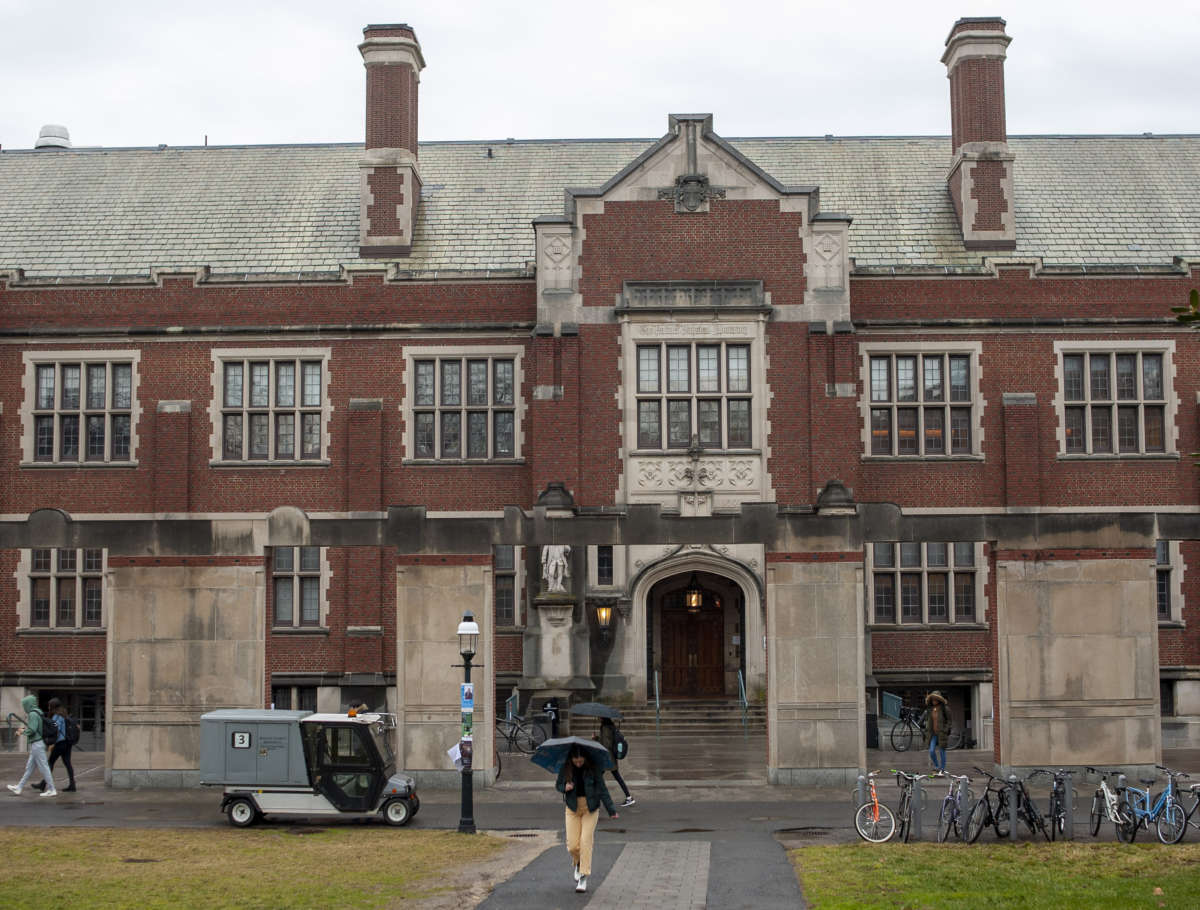Part of the Series
Covering Climate Now
We’ve stormed football fields and staged sit-ins to highlight our universities’ complicity in the climate crisis. We have demonstrated the imperative that our universities, self-proclaimed harbingers of “light and truth” (Yale), acting “in the service of humanity” (Princeton) transition away from fossil fuels as an energy source and take action to limit the Earth’s warming.
As student divestment organizers, we have long maintained that university endowment investments in fossil fuels are irresponsible, dangerous and immoral. Now we present a new conclusion. These investments are not only unethical — they’re illegal.
On February 16, with the help of lawyers at the Climate Defense Project (CDP), organizers at Yale, Princeton, MIT, Stanford and Vanderbilt filed legal complaints with our respective state attorneys general, asserting that our schools’ fossil fuel investments run counter to their charitable purposes as tax-exempt, educational nonprofits, pursuant to each state’s Uniform Prudent Management of Institutional Funds Act (UPMIFA).
These complaints are intended to prompt investigations into the legality of fossil fuel investment by our universities. In the past, after organizers filed similar complaints at Harvard (March 2021) and Cornell (2019), those universities divested within six months of the respective filings, before investigations were even opened. If a successful investigation went forward, confirming that fossil fuel investments violate a state’s UPMIFA, it would set a resounding precedent: Every university, foundation and pension fund would have a clear imperative to divest.
To demonstrate our schools’ violations of UPMIFA, we evidence the scientific realities and social consequences of climate change, presenting fossil fuel companies’ attacks on university climate researchers — and the risky, underperforming nature of the industry — as a violation of the duty of care, a legal imperative outlined by UPMIFA. We identify conflicts of interest at the highest institutional levels; chancellors, trustees, members of investment committees and donors to our schools are among those tied to the fossil fuel industry. Their undue influence is a violation of the duty of loyalty.
Our complaints have been signed by prominent climate researchers, faculty members, alumni and community organizations. Among them are Intergovernmental Panel on Climate Change authors including Richard Somerville, activists such as Bill McKibben, and government officials including former Sen. Timothy Wirth and former Commissioner Bevis Longstreth of the Securities and Exchange Commission — whose work inspired the very UPMIFA laws we cite.
We are proud that our universities produce leading research on the climate crisis. They are uniquely positioned to illuminate how greenhouse gases and pollutants propel our world ever closer to a future of devastating environmental consequences. Our schools are, in some ways, working to improve the world today and for future generations. Yet, we, and the generations after us, will come of age in a world that is hotter, increasingly inhospitable, prone to environmental catastrophes and epidemics, unequal, impoverished and more environmentally degraded than ever before.
Ours is a coalition that spans the country. Our partnership exemplifies the kind of cross-state, cross-institutional coordination required to tackle the climate crisis at a national scale.
The destructive effects of climate change are already jeopardizing lives and livelihoods in the communities in which our schools are located. In Palo Alto, California, where Stanford is located, smoke from nearby wildfires in 2020 was so severe it caused heart attacks and strokes. On the day classes at Yale were meant to return to an in-person format after more than a year online, flooding damage from Hurricane Ida forced students back to Zoom, while Princeton students were told to shelter from tornadoes in flooding basements. Nearly 10 percent of all properties in Nashville, Tennessee, where Vanderbilt is located, are severely threatened by flooding, and much of Cambridge, Massachusetts, could be underwater within 100 years, leaving MIT’s campus at risk. Even by measures of self-interest alone, fossil fuels are not good investments. These holdings violate our schools’ fiduciary duties to their students and their most basic commitments to keep us safe.
Divestment is the most powerful indictment. Rather than allowing selfish actors to set their own timetables for change, divestment is an immediate and concrete action that moves capital away from exploitive corporations and hinders their ability to wreak destruction on our bodies, ecosystems and communities. We believe that endowments, especially ones of the staggering size represented by our universities, are inherently political forces that are never “neutral.”
But it is clear we can’t rely on moral appeals to dig us out of the pit of climate emergency. Despite knowing it’s wrong to profit off the destruction of students’ futures, our universities continue down the road of complicity with their irresponsible investments. Direct action and rhetorical ethics alone haven’t been enough to inspire them to do what’s right.
This legal approach puts teeth in the moral argument activists have been making for decades. The window is closing for our schools to do what is right on their own terms. Soon, they will be divesting on our terms, and the law’s.
Join us in defending the truth before it’s too late
The future of independent journalism is uncertain, and the consequences of losing it are too grave to ignore. To ensure Truthout remains safe, strong, and free, we need to raise $24,000 by the end of today. Every dollar raised goes directly toward the costs of producing news you can trust.
Please give what you can — because by supporting us with a tax-deductible donation, you’re not just preserving a source of news, you’re helping to safeguard what’s left of our democracy.
